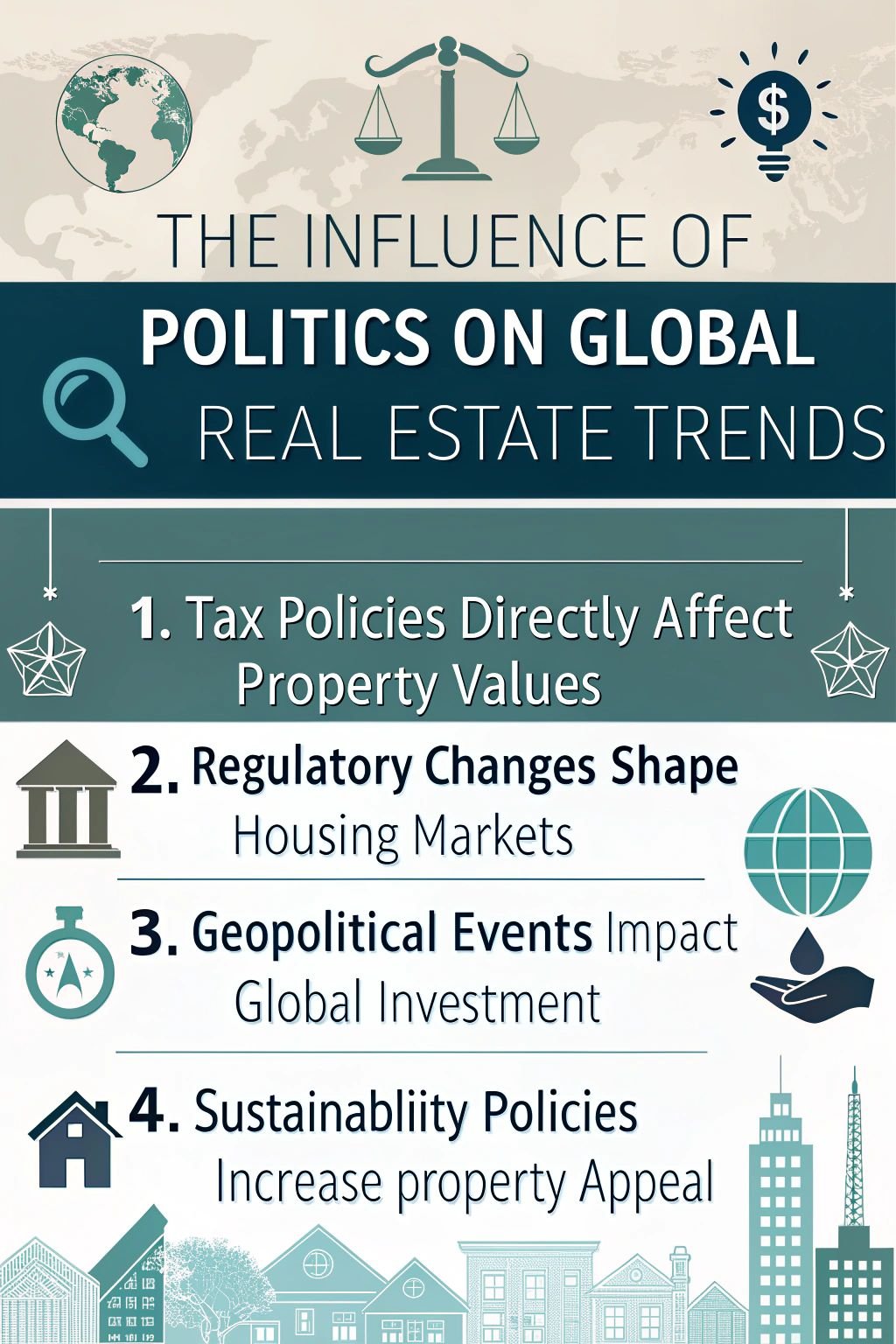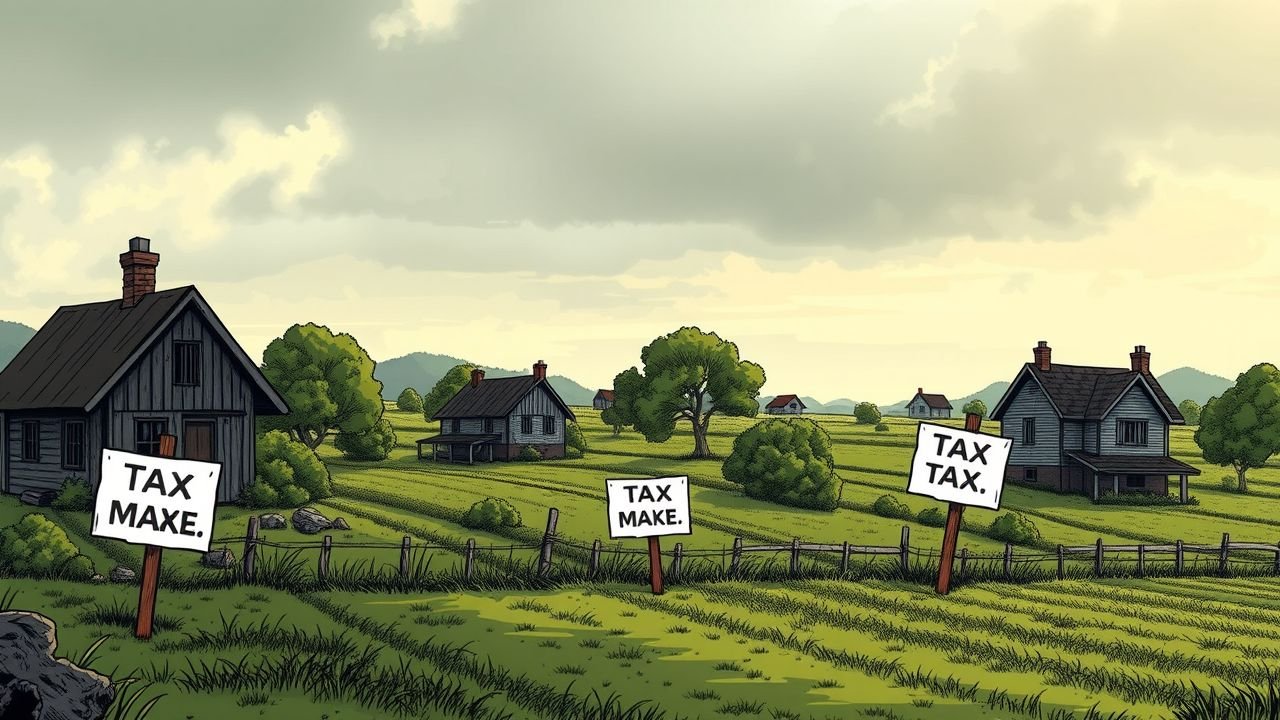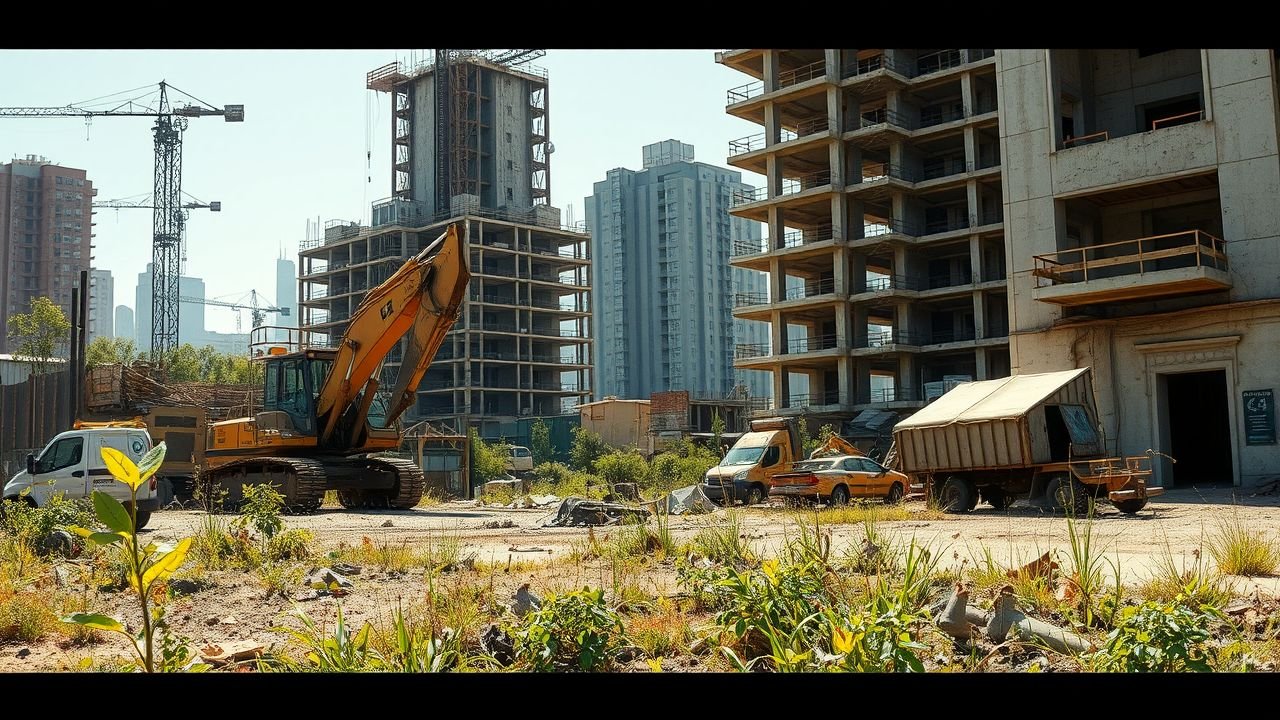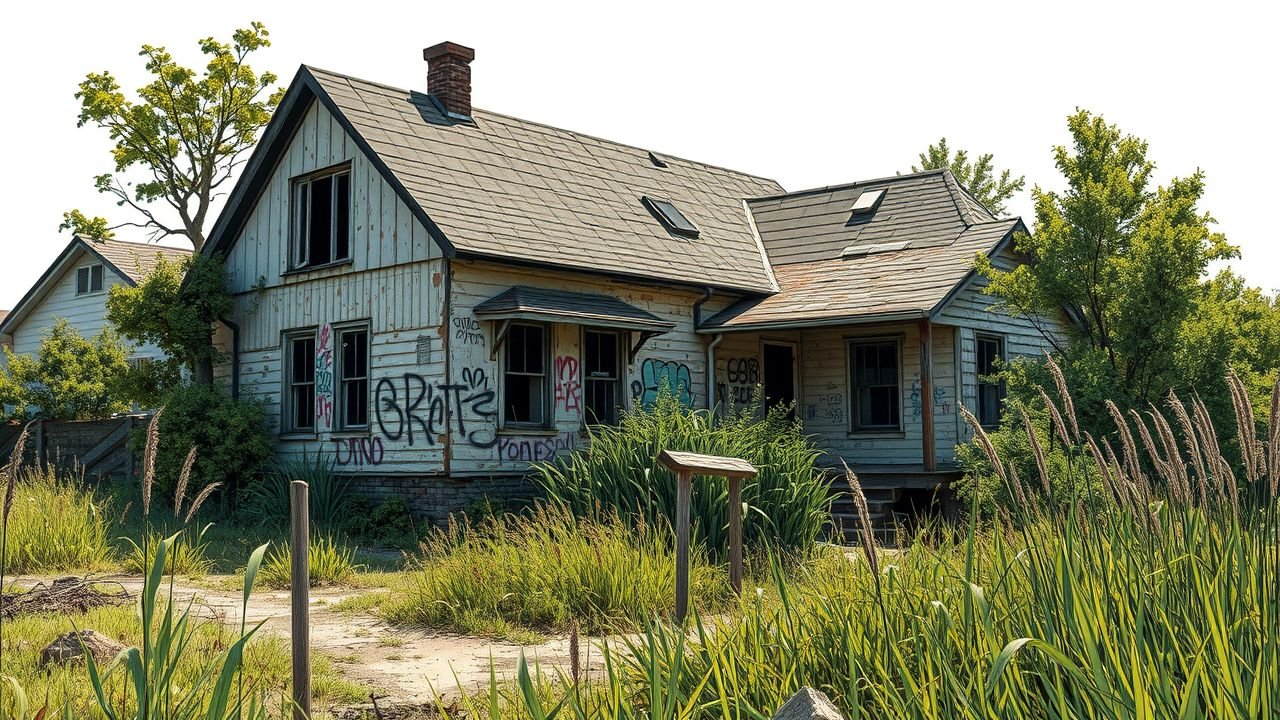Politics influences the global real estate market more than you may imagine. From tax policies to zoning laws, government decisions affect everything from property values to housing supply. 2 If you’re a buyer, seller, or investor, this can create complications and unpredictability in your plans.
For example, political instability often reduces investor confidence and slows market activity. 2 This means housing prices or demand might change unexpectedly depending on new regulations or political events. 3
In this blog, you’ll gain clear insights into how politics impacts real estate trends worldwide. You’ll find strategies to adjust during uncertain times and learn from real-world examples.
Stay informed—read on!
Key Takeaways
- Political decisions, such as tax policies and zoning laws, have a direct impact on property values and market trends. For instance, Andorra’s 10% capital gains tax attracts investors compared to Spain’s 25%.
- Regulatory changes like the Dodd-Frank Act (2008) affect housing markets by restricting mortgage access or development opportunities. Rent control laws in cities like San Francisco deter long-term investments.
- Geopolitical events influence real estate on a global scale. Brexit led to a drop in UK foreign investment after 2016, while China’s Evergrande crackdown sent shockwaves through international markets in 2021.
- Sustainable policies now play a key role in global real estate. Green-certified buildings command higher rents thanks to environmentally conscious regulations encouraged by programs like Saudi Arabia’s Vision 2030.
- Political instability diminishes investor confidence, slowing transactions and disrupting the supply-demand balance. Examples include London post-Brexit and the Russia-Ukraine war driving up construction costs worldwide.

The Influence of Politics on Global Real Estate Trends

Government decisions can impact the real estate market overnight. Policies on taxes, housing rules, and spending directly influence property prices and investor behavior.
Impact of Tax Policies on Property Values
Tax policies directly affect property values by influencing investment decisions and housing affordability. High property taxes can discourage homebuyers, reducing demand and lowering prices.
Lower tax rates often attract buyers and real estate investors, driving upward trends in the market. For example, Andorra’s 10% capital gains tax attracts investors compared to Spain’s higher 25%. 1 Tax-friendly countries like St. Kitts and Nevis even provide citizenship benefits, sparking significant interest in their real estate markets.
Changes in deductions also impact what you might pay for a home or earn as a landlord. Adjusting mortgage interest deductions influences your total costs of owning property or renting it out.
“Taxes act as powerful forces shaping every buyer’s decision,” an expert shares insightfully. Gaining a clear understanding of how capital gains taxes or new levies increase expenses helps secure returns on your investments long-term.
Regulatory Changes and Market Instability
Regulatory changes can shift real estate markets overnight. For example, the 2008 Dodd-Frank Act enforced stricter banking rules. This reduced mortgage access for many home buyers and slowed housing demand. 2 As a result, property values in certain areas declined sharply, leaving investors cautious about future policies. Complex zoning laws or sudden rent control measures also create challenges for landlords and developers alike.
Some cities impose regulations that drive investors elsewhere. In Barcelona, new developments now require 30% of units to be affordable housing since 2018. This policy encouraged developers to move toward Madrid, where requirements are less strict.
Such abrupt shifts increase market unpredictability while affecting job creation and foreign investment patterns across regions reliant on real estate development earnings.
Political Uncertainty and Investor Confidence
Shifts in regulations often spark fears about the future. Political instability, such as elections or scandals, can quickly erode investor confidence. 2 Uncertainty clouds decision-making and slows real estate market activity.
For example, Brexit disrupted the UK housing market due to unclear policies on trade and immigration.
Decreased investor trust leads to fewer transactions and rising risks for real estate investments. Housing supply may fall during periods of unrest, causing price inflation. After World War II, political stability in the U.S. encouraged a housing boom with increased job creation and public investment in affordable housing projects like suburban developments.
Today’s investors remain cautious when facing similar global uncertainties.
Examples of Political Impact on Real Estate

Political decisions can rapidly impact housing affordability and property values. Changes in government spending or economic policies often reshape real estate investment opportunities for buyers and sellers alike.
Historical Instances of Political Influence
Political decisions have always shaped real estate markets globally. These choices often influence property values, housing demand, and investment strategies. 3
1. Post-WWII Housing Boom in the U.S.
Government policies spurred a massive housing boom after World War II. The GI Bill provided affordable loans for veterans, creating suburban neighborhoods. Policies promoting job creation fueled economic growth, increasing housing demand. 2
2. The Brexit Vote’s Effect on the UK Market
The 2016 Brexit vote introduced uncertainty in the United Kingdom’s real estate market. Foreign investors paused plans as they feared political instability and changes to trade protection laws. Property prices dropped in London by nearly 10% in high-value areas soon after the vote.
3. San Francisco and New York Rent Control Policies
Rent control laws impacted these two major cities’ real estate markets heavily. Limiting rental hikes led to fewer available properties since landlords avoided long-term investments. At the same time, rents skyrocketed for units exempt from rent control rules, affecting housing affordability overall.
4. Impact of the Dodd-Frank Act in 2008
In response to the global financial crisis of 2008, policymakers enacted the Dodd-Frank Act to tighten lending regulations. This measure curbed risky mortgage practices but made it harder for first-time buyers like you to access loans easily.
5. Urban Exodus During Pandemic Lockdowns
COVID-19 lockdowns highlighted how government restrictions could trigger sudden demographic shifts within real estate markets. Remote work policies encouraged families and professionals to move from urban centers into suburban or rural areas with more space.
Recent Political Events Affecting Real Estate Markets
Political events directly influence real estate markets. From changes in tax policies to economic sanctions, governments impact property values and investment trends.
- Tax Policies in the U.S.
Shifts in tax laws affect property taxes and mortgage interest deductions. In 2017, the Tax Cuts and Jobs Act placed a cap of $10,000 on state and local tax deductions. This created higher costs for buyers in high-tax states like California and New York, leading to decreased housing demand. - Brexit’s Effect on UK Real Estate
The uncertainty surrounding Brexit diminished investor confidence in the UK market. London experienced a decline in foreign investments from Europe after 2016. Housing prices plateaued, and renters encountered growing competition for available units. - Russia-Ukraine War’s Impact
Global political tensions caused by the war increased energy costs worldwide, heavily affecting real estate development budgets. Supply chain disruptions led to reduced availability of construction materials, slowing housing projects globally. - Rent Control Laws in Major Cities
Local governments employed strict rent control measures to address housing affordability in cities like Berlin and San Francisco over recent years. These policies led to mixed outcomes, protecting tenants but reducing incentives for new developments due to lower profitability. - Interest Rate Hikes Driven by Inflation
Political efforts to address inflation prompted central banks to increase interest rates rapidly after 2021. Higher mortgage rates made housing less affordable for buyers in markets such as the U.S., Canada, and Australia. - China’s Real Estate Crackdown (2021)
Strict government regulations targeted private developers like Evergrande, curbing risky borrowing practices in China’s heavily leveraged market. These restrictions led to defaults that impacted global financial systems closely tied to Chinese investments. - Immigration Policy Shifts Influencing Demand
Adjustments to immigration policies in various countries significantly altered housing demands for newcomers or skilled workers in recent years. For example, Canada’s welcoming approach increased the need for affordable homes near urban areas. - Infrastructure Investments Under Biden Administration
Infrastructure packages passed during the Biden administration aimed to improve public transportation, enhancing neighborhood accessibility across the nation by 2022. This resulted in higher property values near transit hubs in areas such as Chicago or the Atlanta metro.
Geopolitical Factors and Real Estate

Global politics significantly influences the flow of foreign investments and property values. Changes in international policies affect housing demand and market trends across borders.
Foreign Investment Dynamics
Political stability attracts foreign investment into real estate markets. Countries with fewer risks, like Canada or Australia, often see higher demand for residential and commercial properties.
Foreign buyers actively influence housing demand and property values in these regions, especially in urban centers. 5
Increased regulatory attention now restricts large-scale purchases by overseas investors. For example, China tightened its capital outflow policies in recent years to reduce excessive offshore investments, impacting global markets.
Changes in geopolitical events can rapidly create uncertainty for these investments, leading directly to market instability.
Discover how international politics influence broader real estate trends next.
Influence of Global Political Climate on Real Estate
Geopolitical tensions reshape real estate markets across the globe. Events like trade wars or sanctions can shift property values and alter housing demand in affected regions. For instance, populism has led to stricter immigration policies, affecting housing affordability in areas with growing immigrant populations. 6 You might notice foreign investment fluctuates as political stability becomes uncertain, making investors hesitant about placing money into uncertain markets.
Global conflicts often lead to reduced investor confidence, impacting real estate investment trends. If a country faces political instability, you may observe currency depreciation driving up costs for international buyers or reducing their purchasing power.
Changes in central banks’ monetary policies during such times also create inflationary pressure on mortgage interest rates. Paying close attention to these shifts helps you anticipate how they might influence your local market decisions over time.
The Role of Sustainable Development in Shaping Global Real Estate

Sustainable development reshapes how you view the real estate market. Incorporating eco-friendly practices, like energy-efficient construction and renewable technologies, has become essential in today’s housing demand.
Vision 2030 in Saudi Arabia sets a powerful example by aligning national growth with global climate change goals. 7 This program encourages real estate developers to prioritize affordable housing that reduces environmental harm while ensuring long-term property values.
Environmental regulations connected to sustainable policies now influence property decisions worldwide. Governments provide incentives for projects reducing carbon footprints or improving energy efficiency.
For example, green-certified buildings often command higher rents and attract environmentally conscious tenants or investors seeking liquid assets with lower risks. These trends directly affect your buying or selling strategies as more cities adopt stricter zoning laws promoting eco-conscious designs.
Climate change continues driving this evolution as urban areas face rising costs from extreme weather events or outdated infrastructure. Sustainable real estate evolves with solutions like low-income housing developments built to withstand such challenges while remaining cost-effective for residents.
As these initiatives expand further into economic activities, understanding their future impact becomes essential before exploring ways to adapt through shifting political landscapes.
Adapting Real Estate Strategies During Political Shifts

Adjust your real estate investments by staying informed about political policies that influence property values and market trends. Discover how smart strategies can help you handle challenges with confidence.
Mitigating Risks with Informed Investment Decisions
Study comprehensive market research before making any real estate investment. Reliable data helps you predict property values, housing demand, and interest rates more accurately. Work with local experts to understand zoning laws, tax policies, and environmental regulations specific to your target area.
These strategies minimize exposure to political instability or unforeseen regulatory changes.
Spread investments across regions or property types to reduce risks tied to one market. 2 Currency fluctuations can affect your returns if investing internationally. Use stable currencies or currency hedging strategies for improved financial outcomes. 8 Staying updated about economic policies and global political climates enhances decision-making in uncertain markets.
Case Studies of Strategic Adaptations in Various Markets
Adapting real estate strategies during political shifts often means understanding how policies shape markets. Here are real-world examples where investors and developers made strategic moves.
- San Francisco Rent Control Policies
Strict rent control laws in San Francisco led to reduced housing supply. Property owners shifted investments to areas without these regulations, increasing demand and prices in uncontrolled sectors. This adjustment emphasizes the importance of being adaptable to local housing policies. 2 - Tech Boom in Austin and Seattle
Tax breaks for tech companies like Amazon in Seattle drove a surge in property demand. In Austin, similar incentives caused housing shortages and skyrocketing property values. Investors who spread investments into secondary markets minimized risks while benefiting from growth trends. - Foreign Investment Focus in London
Political stability in the United Kingdom once drew global investors to London’s luxury market. Following Brexit-related uncertainties, investor interest transitioned toward mid-market properties with lower volatility risk. By focusing on affordability, many achieved stable returns despite the shifting landscape. - Infrastructure Improvements in Singapore
Singapore prioritized infrastructure investments like expanding public transit systems. These upgrades boosted surrounding neighborhoods’ appeal for both residential and commercial developments. Developers who aligned projects with government plans saw higher profits. - Affordable Housing Initiatives in Germany
Germany encouraged affordable housing construction through tax benefits after the 2015 immigration surges. This policy addressed supply-and-demand challenges while offering developers long-term gains from rental income. - Urban Zoning Laws Shifts in Tokyo
Tokyo eased zoning restrictions ahead of hosting the 2020 Olympics (later held in 2021). Builders capitalized by creating mixed-use developments near key venues, establishing thriving hubs that retained value beyond the event. - Climate-Conscious Development Across Scandinavia
Scandinavian countries enforced environmental regulations requiring eco-friendly building practices post-2010 climate agreements. Real estate teams shifted focus to green-certified projects, attracting cautious buyers interested in sustainable options. - Immigration Policies Driving Demand in Canada
Canada’s pro-immigration stance boosted urban housing demand between 2018-2022, especially among younger buyers entering cities like Toronto and Vancouver. Builders responded by offering more affordable units for first-time homeowners instead of solely luxury properties. - Government Subsidies Supporting Growth Post-COVID-19
After COVID-19 lockdowns lifted globally, nations like Australia provided subsidies for new homebuyers to stimulate economic activity by 2021–22. Strategic real estate firms launched campaigns targeting locals eager to take advantage of these offers, remaining successful despite previous disruptions. - Rent Control Expansion Challenges Across New York City
In New York City, extended rent control measures prompted landlords to sell or convert buildings into co-ops or condos during significant financial downturns such as the 2008 crash or pandemic-era challenges starting in the early 2020s—showcasing flexibility in response to sweeping legislative changes affecting the broader industry.
Conclusion

Politics influence global real estate significantly. Tax policies, zoning laws, and regulations affect property values and investment decisions. Political changes require effective strategies to safeguard your assets.
Keep yourself updated and respond swiftly to shifts in the market. A stable political environment can transform challenges into opportunities for progress.
For more insights on how sustainable development is shaping the future of global real estate trends, visit our detailed article here.
FAQs
1. How does political instability affect the real estate market?
Political instability can cause uncertainty in the real estate market. It often leads to risk-averse behavior, reduced foreign investment, and fluctuating property values.
2. What role does monetary policy play in real estate trends?
Monetary policy impacts interest rates set by central banks, which directly influence housing demand, mortgage costs, and overall real estate investment activity.
3. How do tax policies shape housing affordability?
Tax policies like mortgage interest deductions or changes in income taxes can either improve or reduce housing affordability for buyers and renters.
4. Can immigration policies influence urban real estate development?
Yes, immigration policies affect population growth and job creation, which drive demand for affordable housing and impact zoning laws in cities.
5. Do environmental regulations impact property values?
Environmental regulations tied to climate change or sustainable practices can increase costs for developers but may also boost long-term property values due to environmentally friendly features.
6. What is the connection between economic policies and supply-and-demand trends in real estate?
Economic policies that promote job creation or address income inequality can shift supply-and-demand dynamics by increasing purchasing power or expanding access to affordable homes.
References
- ^ https://www.researchgate.net/publication/383589941_Evaluation_of_Property_Taxes_and_Their_Impact_on_the_Real_Estate_Market (2024-10-22)
- ^ https://crestnetwork.com/political-changes-devastate-real-estate-3-lessons/ (2024-06-23)
- ^ https://www.forbes.com/councils/forbesbusinesscouncil/2023/02/06/the-influence-of-politics-and-policy-in-the-real-estate-market/
- ^ https://www.mmranchlandinvestments.com/articles/real-estate/politics–impact-on-real-estate (2023-10-20)
- ^ https://www.researchgate.net/publication/312503310_The_Globalisation_of_Real_Estate_The_Politics_and_Practice_of_Foreign_Real_Estate_Investment (2024-10-22)
- ^ https://www.perenews.com/private-real-estates-collision-course-with-geopolitics/
- ^ https://fiabci.org/en/news-room/view/425
- ^ https://www.ipglobal-ltd.com/insights/how-to-mitigate-risks-in-global-real-estate-investment/ (2024-09-18)





















